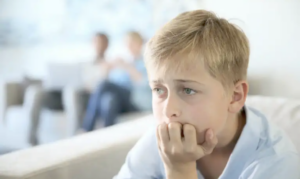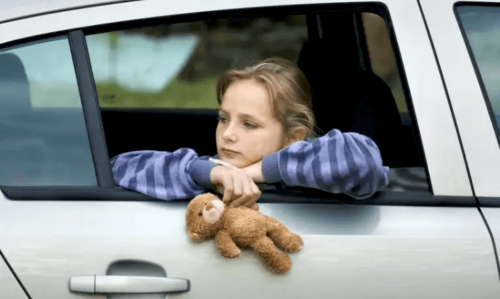The Impact of Emotional Deficiencies On Child Development


Reviewed and approved by the psychologist Bernardo Peña
Emotional deficiencies can cause serious problems in children, even though many of them don’t manifest it until they reach adulthood. It’s then when people begin to encounter difficulties we’re unable to solve.
Among these problems are those involving interpersonal relationships that lead us down the path of bitterness when we don’t know how to solve them. Everything comes from behind, derives from our childhood.
Emotional deficiencies hurt

Within the affective deficiencies, we find unstable and traumatic family situations, abuse, neglect, etc. As you can see, there is a lack of affection towards the child who feels everything deeply.
Why do we allow it? Do parents not realize how much it can affect them in the future? The truth is that parents believe the little ones aren’t aware of what’s really happening and are “calm” about it.
However, the reality is completely different. The smallest of the house are receptive and tuned in to any multiple negative stimuli they’re exposed to during childhood. All of this will condition their day tomorrow.
It is here when problems of emotional dependence, fear of loneliness and various difficulties in maintaining healthy relationships with other people arise over the years. That which one day the elders thought would not affect them has done so, and in a big way.
Find out how to Express Your Affection to the People You Love Every Day
Symptoms of emotional deficiencies in children
It’s true that the difficulties become more acute when we’re adults. However, many can be detected in childhood but you must be alert and pay attention. This is because some of them are intermittent.
If you prevent lack of attention during childhood, the result will be positive. In turn, do nothing and when children become adults they’ll have to face all kinds of barriers.
Among the symptoms of emotional deficits in children, as evidenced in this article published in Centre London magazine, are the following:
- Problems with impulse control
- Abrupt changes in behavior
- Generalized distrust towards others
- Aggressive responses
- Poor language development and social skills
- Attention deficit
- Anxiety disorders
- Difficulties expressing feelings and problems modulating them
Many of these symptoms can carry over into adulthood and, in many cases, in a more painful and worrying way. In this respect, we’re in an advanced stage of the problem that won’t be easy to solve.
The deterioration of child development
As you can see, a lack of affection not only affects a child’s emotions and their ability to transmit their feelings. Their development also takes a toll. This causes serious setbacks in their learning from a young age.
Stress and anxiety, so strange in these early stages of life, are one of the most striking symptoms not to overlook, as per this study conducted at the University of Cuenca in Ecuador. They’re not usual characteristics in one of the ages of greater enjoyment and relaxation with respect to the worries adults have.
But does all this arise in extreme circumstances? The truth is it isn’t necessary to encounter situations of abuse, abandonment, or divorce for children to develop affective deficiency.
The importance of education

Poor quality education can also lead to the deterioration of child development and possible future difficulties that’ll significant impact them. An example of this poor education is the number of hours a child spends in front of the TV.
The work of parents and the little desire they have to put up with their children’s tantrums causes them to resort to certain comforts such as the computer, cell phones and tablets, video games, etc. Children don’t enjoy themselves because they don’t go out and interact with others. There’s only a screen and it stuns them.
Every child needs rules and values and care to prepare them to be good, responsible. Neglect what they need out of laziness and the the lack of affection will be detrimental.
In this respect, as this research published in the journal Razón y Palabra shows, communication in the family is essential to prevent emotional deficiencies.
How to deal with emotional deficiencies in children
The problems derived from lack of affection are associated with the lifestyles of families. For this reason, families must act as preventive agents and intervene when the little ones need help.
All cited sources were thoroughly reviewed by our team to ensure their quality, reliability, currency, and validity. The bibliography of this article was considered reliable and of academic or scientific accuracy.
- Bielsa, A. Carencia afectiva. Centre Londres, 94, 1-19. http://www.centrelondres94.com/files/carencia_afectiva_1.pdf
- Contreras, G. (2010). “La Carencia Afectiva Intrafamiliar en niños y niñas de 5 años” (Tesis.) http://dspace.ucuenca.edu.ec/bitstream/123456789/2338/1/tps637.pdf
- Hernández, I. C. S., & Palacio, H. L. (2014). Acciones de orientación familiar para prevenir la carencia afectiva en los niños mediante la comunicación. Razón y palabra, 18(88). https://www.redalyc.org/pdf/1995/199532731033.pdf
-
Vidal, M. S. M. M. L. (2017). La orientación familiar y las carencias afectivas en el desarrollo del escolar ecuatoriano. https://scholar.archive.org/work/4zrkg4s7ofauvkxc7g64v4anzm/access/wayback/https://transformacion.reduc.edu.cu/index.php/transformacion/article/download/241/pdf
This text is provided for informational purposes only and does not replace consultation with a professional. If in doubt, consult your specialist.








